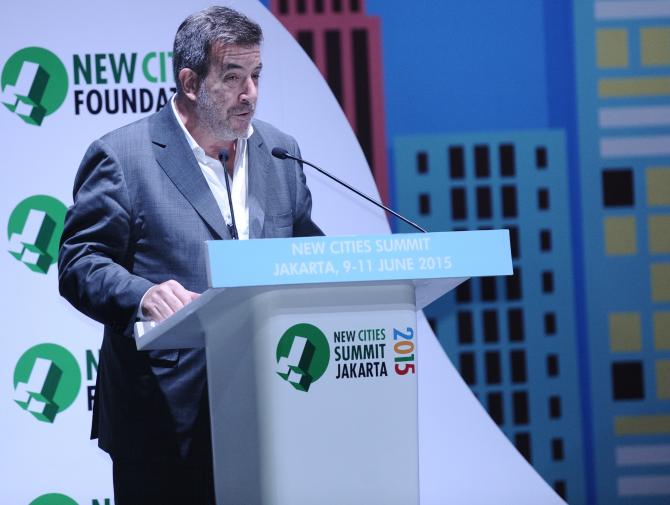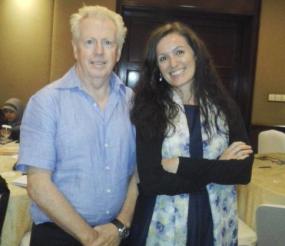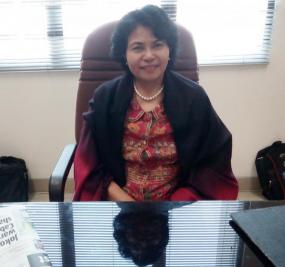
John Rossant is the Chairman of New Cities Foundation, an organization working on urbanization and the growth of cities in the world. After events in Paris, Sao Paolo, and Dallas, he came to Jakarta in June especially to discuss the rise of cities and our future in the annual New Cities Summit. He also has written an article for the July-September edition of Strategic Review’s print journal.
1. Jakarta was chosen to host of New Cities Foundation due to its status as a mega Asian city, but what makes it different from the others?
Well, there are a number of reasons. I think one is the importance of Jakarta on a regional and global scale. It’s a very big, very important city; it’s the capital of an extremely important country.
Two, it’s a city that has many of the problems of other cities. Traffic congestion, housing, access to water, and these are the result, in my view, of many, many years of underinvestment in infrastructure, among other things. So, it would have been very easy to go to Singapore but not very interesting. So I think what’s fascinating about Jakarta is that you are grappling with some of the most important issues that cities face everywhere. New York has a terrible traffic problem, London has a terrible traffic problem, and Jakarta has it, a lot of it.
My belief, my very strong belief, is that cities can learn from each other, and must learn from each other. It’s not only a city in the United States of America coming up with solutions for Jakarta; it can be the other way around.
What’s so interesting about Jakarta is its very entrepreneurial spirit, its huge economic dynamism. It’s a very youthful city, so we see over and over a quite interesting solution being developed that can also be used elsewhere. You see people coming to this conference from all over the world – the United States, Peru, Russia, China, parts of Africa – and they also come to learn about things that are happening in the city.
It’s also one very particular moment politically in this country, with both Jokowi [Joko Widodo] as president and Ahok [Basuki Tjahaja Purnama] as the Governor of Jakarta, where you have seriously reformist administrations fighting corruption, and at least saying that they want to start investing seriously in infrastructure. It’s a very good moment to be here, the timing is also important.
2. You mention that Jakarta has a lot of problem, from traffic to access to water. How do you see the big issues in the city?
One big issue is the disparity, the gap between many poor people and more wealthy people, and Jakarta is not the only city with that [problem]. In New York, this is a very real issue. This is the top of Mayor [Bill] de Blasio’s agenda, how to make the city more inclusive. Every city is grappling with this, we’re in this luxurious, beautiful Ciputra Center but a hundred meters away, people are sleeping on the streets. I think that is a very important issue, and obviously Ahok recognized that in his speech [to the conference]. It is not sustainable for cities in the long term to have that kind of gap between the wealthy and the less wealthy.
3. Can you elaborate more on why people should care about urbanization and the sustainability of cities?
That’s very easy to answer, and it’s a very great question. If you go back thirty years, a very recent past, Indonesia was largely rural, very largely rural like China. Thirty years ago, only 20 percent of Chinese lived in the cities. In fact, the whole Communist Revolution in China was about the world’s peasant societies, they really neglected the cities. Completely the opposite, most of humanity now lives in the cities. At some point in 2009, the human population passed the 50 percent point, the majority of people live in cities now.
By the way, half the urban population in the world is in Asia. That’s why we have to be interested in cities, that’s where the people live, that’s where the economy is, where wealth is created, it’s where the culture is, it’s where the media is. So we believe that cities are the motors, and should be the motors of progress in society.
4. The growth of cities will affect the dynamic of the whole country. In your speech, you stated that two thirds of the Indonesian population will live in cities by 2050. What does it mean for the rest of the country, particularly the rural areas? Will it be sustainable?
That’s a very good question because it’s one of those things that we don’t talk about here, and we should talk about what happens to the rural areas. When a lot of the young generation come to the city because it’s more exciting, or for jobs, you’ll have rural areas full of older people, and that’s not sustainable because they provide the agriculture etc.
One of the most interesting things is when we look very closely to the role of technology, we’re at a fundamental turning point in history where digitalization, cloud computing, big data, things like these are really transforming life in the cities. But it will also transform life in the rural areas.
In Indonesia and Africa, you have even very poor farmers who are benefiting from these kinds of things. Well maybe not an iPhone, but something a little slimmed down, and it makes them much more efficient, makes food production to be more efficient, allows them to make a community much more. It’s really extraordinary what is happening here. Farming has become much more efficient everywhere around the world, so you don’t need that many people in rural areas compared to the cities. You can have probably, by the end of the century, 80 percent living in the cities and 20 percent living in the rural areas.
When you mention sustainability, cities, when they are organized correctly, are very sustainable. They use energy very efficiently compared to if you live in the country. You have to get from point A to point B in a car, which is smelly, consumes lot of fuel, and in the cities you probably use public transportation. You live very energy efficiently in the cities; in fact, per capita output of greenhouse gases is lower in the cities than the rural areas. A certain equilibrium will be reached.
5. Jakarta will be home for 40 million people by 2050. What should the government of Jakarta do to prepare for that?
The city needs much, much better infrastructure, especially transportation. The MRT is one solution, but clearly, I’m not sure if it’s sustainable that you have, everyday, so many millions of people coming into the city to work and returning in the evening. It creates a strain in transportation. So I think what Ahok was saying earlier is very true, that we have to increase the population density of Jakarta. So people work where they live, and don’t have to travel.










 resized.png)
